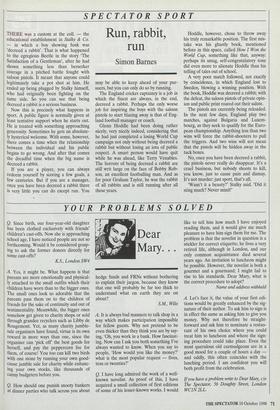YOUR PROBLEMS SOLVED
Dear Mary. . .
Q. Since birth, our four-year-old daughter has been clothed exclusively with friends' children's cast-offs. Now she is approaching school age, I have noticed people are not so forthcoming. Would it be considered grasp- ing to ask the former donors directly for some cast-offs?
KS., London SW4 A. Yes, it might be. What happens is that Parents are more emotionally and physical- ly attached to the small outfits which their children have worn than to the bigger ones. The small ones look so adorable that the parents pass them on to the children of friends for the sake of continuity and out of sentimentality. Meanwhile, the bigger ones somehow get given to charity shops or sold through grandee recyclers such as Libby de Rougemont. Yet, as many charity jumble- sale organisers have found, virtue is its own reward in more ways than one, since the organiser can 'pick off the best goods for herself, and pay the peppercorn fee for them, of course! You too can kill two birds with one stone by running your own good- cause jumble sale for charity while enhanc- ing your own stocks, like thousands of canny budgeters before you.
Q. How should one punish snooty bankers at dinner parties who talk across you about hedge funds and FRNs without bothering to explain their jargon, because they know that one will probably be far too thick to understand what on earth they are on about?
S.M., Wilts A. It is always bad manners to talk shop in a way which makes participation impossible for fellow guests. Why not pretend to be even thicker than they think you are by say- ing, 'Oh, you work in a bank. How fascinat- ing. Now can I ask you both something I've always wanted to know. When you say to people, 'How would you like the money?' what is the most popular request — fives, tens or twenties?'
Q. I have long admired the work of a well- known novelist. As proof of this, I have acquired a small collection of first editions of some of his lesser-known works. I would like to tell him how much I have enjoyed reading them, and it would give me much pleasure to have him sign them for me. The problem is that the novelist in question is a stickler for correct etiquette; he lives a very retired life, although in London, and our only common acquaintance died several years ago. An invitation to luncheon might be possible. However, the novelist is both a gourmet and a gourmand; I might fail to rise to his standards. Dear Mary, what is the correct procedure to adopt?
Name and address withheld A. Let's face it, the value of your first edi- tions would be greatly enhanced by the sig- nature of their author. To ask him to sign is in effect the same as asking him to give you money. Why not therefore be straight- forward and ask him to nominate a restau- rant of his own choice where you could treat him to luncheon and where the sign- ing procedure could take place. Even the most querulous old curmudgeons are in a good mood for a couple of hours a day — and oddly, this often coincides with the lunching period. I am confident you will both profit from the celebration.
If you have a problem write to Dear Mary, clo The Spectator, 56 Doughty Street, London WON 2LL.










































































 Previous page
Previous page